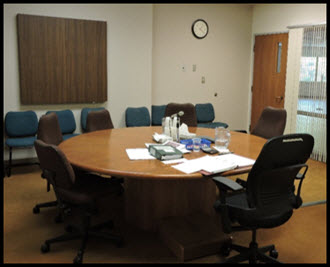Note: Since May 2020, conferences in family and small claims matters are being conducted by telephone, audio- or video-conference. See Virtual conferences and hearings (by phone or video) for more information.
The BC Provincial Court’s Small Claims Court usually deals with cases involving from $5,001 to $35,000. Larger claims generally go to the BC Supreme Court. It is possible to make a claim for more than $35,000 in Small Claims Court, but if you do you must abandon the amount over that limit.
Although a Provincial Court judge cannot award you more than $35,000 plus interest and expenses, people sometimes choose to abandon part of their claim in order to take advantage of the simpler procedures in Small Claims Court. This eNews article explains some of the differences between Small Claims Court and Supreme Court procedures for claims in that range.
Procedures
Small Claims Court offers Settlement Conferences where the parties to a lawsuit meet with a judge to discuss whether it’s possible to settle the claim without a trial. If that’s not possible, the judge will usually make orders to help the parties prepare for trial, including orders to exchange all relevant documents and summaries of what their witnesses will say. For longer trials, there may also be a Trial Conference to ensure everyone is prepared for trial.
Small Claims Court is designed to make it relatively easy for people to conduct their own trials without a lawyer. The Small Claims rules are written in plain language, they have less legalese, forms are simpler, and the rules of evidence can be more relaxed than in Supreme Court.
On the other hand, the BC Supreme Court offers Fast Track Litigation for claims that meet certain criteria, including a dollar value of under $100,000 or a trial that can be completed in not more than three days. Fast Track Litigation is intended to streamline the more complex Supreme Court legal process and reduce the cost of suing in that Court.
The Supreme Court Rules also offer a variety of procedures that may help lawyers resolve some of the issues in a complex case before a trial.
Legal Fees
If you are represented by a lawyer in Supreme Court and you win, you can be reimbursed for at least some of your legal fees. If you hire a lawyer for a Small Claims Court case you cannot be reimbursed for legal fees, even if you win. However, it is possible that legal fees for a Small Claims trial may be lower than for a Supreme Court trial because of the shorter, simpler process.
More information
If you are considering launching a lawsuit for an amount somewhat larger than $35,000 it would be wise to consult a lawyer for advice on which court would work best for you.
See too Small Claims Cases on this website. Note that regardless of the dollar value, Small Claims Court can only deal with claims involving:
• damages (money to compensate for loss or injury)
• recovery of personal property or opposing claims to person property
• performance of agreements about personal property or services.
Cases involving other subjects must be taken to other courts or tribunals.
You may also wish to read Choosing Small Claims or Fast Track Litigation and Fast Track Litigation, Guidebooks produced by the Justice Education Society.
Supreme Court Fast Track vs. Small Claims Court
| Supreme Court Fast Track | Small Claims Court | |
| Maximum claim amount | $100,000 | $35,000 |
| Types of claims | Debt, real property, personal property, builder’s liens, damages (money to compensate for loss or injury) or if the claim can be tried in 3 days or less | Debt, personal property, performance of some agreements, damages (money to compensate for loss or injury) |
| Examination for discovery | Yes (limited to 2 hours unless parties agree to longer) | No |
| Pre-trial discovery of documents | Yes | Exchange of documents is usually ordered at the Settlement Conference |
| Witnesses at trial | Yes | Yes |
| Expert witnesses | Yes | Yes |
| Pre-trial applications to Court | Yes, after a case planning conference has been held | Procedural applications can be made to Registrar or Judge |
| Mediation available | Yes, with Notice to Mediate, in most cases | Mandatory Settlement Conference & additional mediation with Notice to Mediate for claims of $10,000 or more |
| Trial scheduling (wait time) | If you ask for a trial date within 4 months of starting a Fast Track procedure, you can be given a trial date within 4 months. However, lawyers may wish more time than that to prepare so cases are often scheduled later than 4 months from filing. | Wait times for a trial vary according to court location & the length of the trial. For recent wait times for Small Claims trials, see the Provincial Court’s Time to Trial reports. |
| Length of trial | May be limited to 3 days, or time limit set by the judge | Usually shorter |
| Overall cost | More expensive | Less expensive |
| Recovery of court costs (filing fees, allowed expenses, a portion of legal fees) | Amount of costs, excluding disbursements, are based on trial length | Only filing & service fees, and allowed expenses |
This website provides general information only and should not be used as legal advice. Updated October, 2020

